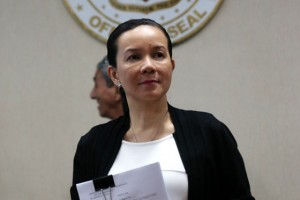Malacañang on Tuesday dropped its defensive stance on the Mamasapano incident and publicly admitted that President Benigno Aquino 3rd has “ultimate responsibility” for the botched operation that resulted in the killing of 44 police commandos.
It was not clear if the Palace did so after getting wind of the release of a report of the Senate Committee on Public Order and Dangerous Drugs on the same day pointing to the President as ultimately responsible for the tragic incident.
Sen. Grace Poe, committee chairman, made the report public around 1:30 p.m., about the same time that Presidential Communications Secretary Herminio Coloma Jr. held a news briefing where he said Malacañang was owning up to the failed mission in Mamasapano, Maguindanao, in southern Philippines.
The President was ultimately responsible because he gave assent to and fell short of preventing unlawful exercise of official functions by then-suspended Philippine National Police (PNP) chief Alan Purisima in connection with Operation Plan (Oplan) Exodus, Coloma said.
He scored the Philippine National Police (PNP) Board of Inquiry (BOI) headed by Police Director Benjamin Magalong for “confusing” Aquino “[breaking ] the chain of command” with the President directly dealing with Purisima and then-Special Action Force (SAF) chief and the commandos’ commander Getulio Napenas.
“There was no such intention [to break the chain of command] and at all times the President checks concrete bases of his actions with what the Constitution says . . . No regulation was broken because in whatever perspective we look at it, whether it is the Chief Executive or the Commander-in-Chief perspective, there is only one principle here, the President has ultimate responsibility,” Coloma told reporters.
The PNP-BOI last week released its fact-finding report on the January 25, 2014 operation to neutralize high-value targets in Mamasapano town.
Although the SAF commandos managed to kill foreign terrorist Zulkifli bin Hir, alias Marwan, 44 policemen died in a fierce clash with rebels from the Moro Islamic Liberation Front and the Bangsamoro Islamic Freedom Fighters.
The Magalong body was formed to find out the truth behind the deadly gunbattle that seemed to have been precipitated by Purisima and Napenas also failing to properly coordinate the elite police troops’ movements with the Armed Forces of the Philippines (AFP).
The President has consistently blamed the now-sacked SAF chief for bungling the operation, owing to Napenas’ apparent lack of “situational awareness.”
He, however, was careful not to put Purisima in a bad light because the two have been the closest of friends since the late 1980s.
Recently, Aquino admitted that Purisma fed him with the wrong information on Oplan Exodus, particularly on the supposed coordination with the AFP for artillery, mechanized and air support, none of which was actually given.
Coloma, meanwhile, explained that the BOI’s use of the term “chain of command” should be clarified as it only applies to the Armed Forces.
Since the PNP is a civilian organization, he said, Aquino’s function as Chief Executive is more apt.
“If we will look closely into the issues here, whether Commander-in-Chief or Chief Executive, the principle remains the same. What is the responsibility of the President? Whether we adopt the Chief Executive perspective or the Commander-in-Chief perspective, the bottom line is he must fulfill his sworn duty to preserve and defend the Constitution and to do justice to every Filipino,” Coloma noted.
Although he credited the PNP-BOI for recognizing Aquino’s “prerogative to directly issue orders to Napenas,” he rued that the Magalong body’s report stated that Aquino “broke the chain of command.”
“That is what we must clarify. When we say he broke the chain of command, it seems like there was willful violation or disregard of a certain law, rule or regulation,” Coloma said.
The President did what he thought was for the best interest of the
country, the Palace official maintained.
And that is, Coloma said, to seek and punish Marwan and another bomb-maker, Abdul Basit Usma, a Filipino.
In an executive summary of the report presented by Poe, her committee
also noted that despite being fully aware that Purisima was preventively suspended by the Ombudsman, the President allowed the now-resigned PNP chief to join the January 9, meeting at Bahay Pangarap inside Malacañang , where the sensitive and classified operation was being discussed.
The President even gave instruction to Purisima to coordinate Oplan Exodus with the AFP and communicated exclusively with Purisima regarding the progress of the mission.
He also instructed Purisima during the conduct of Oplan Exodus as shown by his text message to the then-PNP chief on January 25 that says, “Basit should not get away.” The President was referring to Abdul Basit Usman.
“The President himself admitted that all the communication regarding Oplan Exodus emanating from him to Police Director Getulio Napenas, and vice-versa, was being coursed thorough a then suspended Director General Purisima,” the committee report stated.


